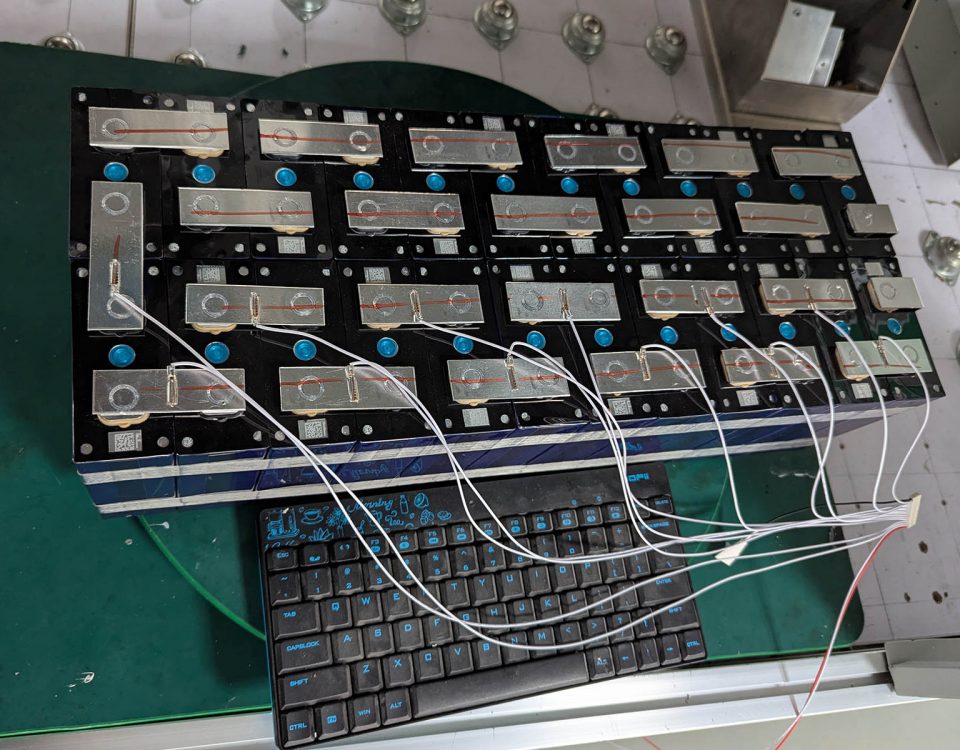การแนะนำ แบตเตอรี่ลิเธียมได้ปฏิวัติวิธีการใช้พลังงานในชีวิตของเรา ตั้งแต่สมาร์ทโฟนและแล็ปท็อปไปจนถึงยานพาหนะไฟฟ้าและระบบพลังงานหมุนเวียน อย่างไรก็ตาม แม้แต่แบตเตอรี่ที่ล้ำหน้าที่สุดก็สามารถเสื่อมสภาพก่อนเวลาอันควรได้หากไม่ได้รับการเก็บรักษาอย่างถูกต้อง สำหรับผู้ใช้และอุตสาหกรรมที่พึ่งพาเทคโนโลยีแบตเตอรี่ลิเธียม การเข้าใจวิธีการเก็บรักษาที่เหมาะสมไม่ใช่เพียงแค่เรื่องความสะดวกเท่านั้น แต่เป็นความจำเป็นในการเพิ่มประสิทธิภาพและประหยัดค่าใช้จ่ายให้สูงสุด ในคู่มือนี้ เราจะสำรวจกลยุทธ์ที่สามารถนำไปปฏิบัติได้เพื่อให้แบตเตอรี่ลิเธียมของคุณมีอายุการใช้งานที่ยาวนานและมีประสิทธิภาพสูงสุด
วิทยาศาสตร์ของการเสื่อมสภาพของแบตเตอรี่ลิเธียม แบตเตอรี่ลิเธียม อายุการใช้งานที่เพิ่มขึ้นตามกาลเวลาเนื่องจากปฏิกิริยาเคมีภายในเซลล์ ปัจจัยหลักสองประการที่ส่งผลต่อการเสื่อมสภาพนี้คือ อุณหภูมิและสถานะการชาร์จ (SoC) อุณหภูมิสูงจะเร่งการสลายตัวทางเคมี ในขณะที่การเก็บแบตเตอรี่ในสภาพชาร์จเต็มหรือหมดจะสร้างความเครียดให้กับอิเล็กโทรด ข้อมูลเชิงลึกเหล่านี้เป็นพื้นฐานสำหรับแนวทางปฏิบัติที่ดีที่สุดในการจัดเก็บแบตเตอรี่ลิเธียม
1. รักษาอุณหภูมิในการเก็บรักษาให้เหมาะสม อุณหภูมิเป็นปัจจัยสำคัญใน
แบตเตอรี่ลิเธียม อายุการใช้งานยาวนาน อุณหภูมิที่เหมาะสมสำหรับการเก็บรักษาอยู่ระหว่าง
15°C และ 25°C (59°F ถึง 77°F). ความร้อนหรือความเย็นที่รุนแรงสามารถนำไปสู่การสูญเสียความสามารถถาวรหรือแม้กระทั่งก่อให้เกิดความเสี่ยงต่อความปลอดภัย.
คำแนะนำ:
-
หลีกเลี่ยงการวางแบตเตอรี่ใกล้แหล่งความร้อน เช่น หม้อน้ำหรือแสงแดดโดยตรง
-
สำหรับการจัดเก็บระยะยาว ควรพิจารณาสภาพแวดล้อมที่มีการควบคุมอุณหภูมิ เช่น ห้องใต้ดินหรือห้องเก็บของที่มีฉนวนกันความร้อน
-
ใช้กล่องป้องกันความร้อนสำหรับแบตเตอรี่ที่สัมผัสกับอุณหภูมิที่เปลี่ยนแปลง
2. ชาร์จไฟให้ถึงระดับที่เหมาะสมก่อนการเก็บรักษา การปล่อยให้แบตเตอรี่ลิเธียมชาร์จเต็มหรือหมดจนเกลี้ยงอาจทำให้เกิดความเครียดภายใน ส่งผลให้อายุการใช้งานโดยรวมลดลง ระดับการชาร์จที่ 40-60% เหมาะสมที่สุดสำหรับการจัดเก็บ โดยให้ความสมดุลระหว่างความเสถียรทางเคมีและความพร้อมในการใช้งาน
คำแนะนำ:
-
หลีกเลี่ยงการเก็บอุปกรณ์ที่เสียบปลั๊กไว้เป็นเวลานาน
-
ลงทุนใน ระบบจัดการแบตเตอรี่ (BMS) หรือที่ชาร์จอัจฉริยะเพื่อตรวจสอบและควบคุมระดับการชาร์จ
-
ชาร์จแบตเตอรี่เป็นระยะๆ ระหว่างการเก็บรักษาระยะยาวเพื่อรักษาระดับประจุที่ต้องการ
3. ป้องกันความชื้นและความชุ่มชื้น แบตเตอรี่ลิเธียมมีความไวต่อความชื้น ซึ่งสามารถกัดกร่อนส่วนประกอบภายในและลดประสิทธิภาพการทำงานได้ การเก็บแบตเตอรี่ไว้ในสภาพแวดล้อมที่แห้งและปิดสนิทเป็นสิ่งสำคัญอย่างยิ่ง
คำแนะนำ:
-
ใช้ภาชนะที่ปิดสนิทหรือถุงสูญญากาศสำหรับการเก็บรักษา
-
รวมไว้ ซิลิกาเจลแพ็ค หรือสารดูดความชื้นอื่น ๆ เพื่อดูดซับความชื้นส่วนเกิน
-
หลีกเลี่ยงการเก็บแบตเตอรี่ในสภาพแวดล้อมที่มีแนวโน้มเกิดการควบแน่น เช่น โรงรถหรือโรงเก็บของที่ไม่มีฉนวนกันความร้อน
4. หลีกเลี่ยงการอยู่นิ่งเป็นเวลานาน แม้ว่าแบตเตอรี่ลิเธียมจะได้รับการออกแบบมาให้สามารถหยุดใช้งานเป็นครั้งคราวได้ แต่หากเก็บไว้นานโดยไม่ใช้งานอาจทำให้ความจุลดลงได้ เพื่อป้องกันปัญหานี้ ควรตรวจสอบและชาร์จแบตเตอรี่เป็นระยะ
คำแนะนำ:
5. ใช้บรรจุภัณฑ์ป้องกัน ความเสียหายทางกายภาพระหว่างการเก็บรักษาอาจทำให้ความปลอดภัยและประสิทธิภาพของแบตเตอรี่ลดลงได้ การบรรจุหีบห่ออย่างถูกต้องช่วยลดความเสี่ยงของการเจาะทะลุ, การกระแทก, หรือการสัมผัสกับสารปนเปื้อน
คำแนะนำ:
-
เก็บแบตเตอรี่ไว้ในบรรจุภัณฑ์เดิมทุกครั้งที่เป็นไปได้
-
หากใช้ภาชนะจากบุคคลที่สาม ให้แน่ใจว่าภาชนะนั้นไม่เป็นตัวนำไฟฟ้าและมีวัสดุรองรับ
-
หลีกเลี่ยงการวางของหนักซ้อนทับบนแบตเตอรี่ที่เก็บไว้
6. ตรวจสอบและบันทึกสภาพการจัดเก็บ สำหรับอุตสาหกรรมและผู้ใช้หนัก การตรวจสอบสภาพการจัดเก็บอย่างเป็นระบบสามารถระบุและป้องกันปัญหาได้ก่อนที่ปัญหาจะเกิดขึ้น
คำแนะนำ:
-
ใช้เซ็นเซอร์วัดอุณหภูมิและความชื้นเพื่อติดตามสภาพแวดล้อม
-
บันทึกข้อมูลวันที่เก็บรักษา ระดับการชาร์จ และรอบการตรวจสอบ
-
นำโซลูชันซอฟต์แวร์สำหรับการจัดการสินค้าคงคลังมาใช้เพื่อเพิ่มประสิทธิภาพในการควบคุมดูแล
ทำไมการจัดเก็บอย่างถูกต้องจึงมีความสำคัญ นอกเหนือจากการรับประกันความปลอดภัยแล้ว การปฏิบัติตามแนวทางการจัดเก็บเหล่านี้ยังสามารถมอบประโยชน์ที่จับต้องได้:
-
อายุการใช้งานที่ยาวนานขึ้น: การลดการเสื่อมสภาพช่วยชะลอค่าใช้จ่ายในการเปลี่ยนทดแทน
-
ความปลอดภัยที่เพิ่มขึ้น: การลดความเสี่ยงจากความร้อนสูงเกินไปหรือไฟไหม้ช่วยให้มั่นใจในความน่าเชื่อถือ
-
ประสิทธิภาพที่ดีขึ้น: แบตเตอรี่ที่เก็บรักษาอย่างถูกต้องจะคงความจุและประสิทธิภาพไว้
แนะนำ RICHYE ริชชี่ เป็นผู้ผลิตแบตเตอรี่ลิเธียมมืออาชีพที่มีชื่อเสียงในการส่งมอบคุณภาพที่ยอดเยี่ยม ประสิทธิภาพ และความปลอดภัย จากการใช้งานในอุตสาหกรรมไปจนถึงความต้องการของผู้บริโภค แบตเตอรี่ของ RICHYE ได้รับการออกแบบมาเพื่อตอบสนองมาตรฐานสูงสุด ได้รับความไว้วางใจทั่วโลก RICHYE ผสานนวัตกรรมกับความน่าเชื่อถือ นำเสนอโซลูชันที่ปรับให้เหมาะกับความต้องการด้านพลังงานที่หลากหลาย เมื่อพูดถึงการยืดอายุการใช้งานแบตเตอรี่และการรับประกันประสิทธิภาพสูงสุด RICHYE คือชื่อที่คุณสามารถไว้วางใจได้
บทสรุป เมื่อความต้องการแบตเตอรี่ลิเธียมเพิ่มขึ้น การเข้าใจวิธีการเก็บรักษาอย่างถูกต้องจึงเป็นสิ่งจำเป็นสำหรับทั้งบุคคลและอุตสาหกรรม ด้วยการควบคุมอุณหภูมิ จัดการระดับการชาร์จ และนำวิธีการเก็บรักษาเชิงรุกมาใช้ ผู้ใช้สามารถยืดอายุการใช้งานและความน่าเชื่อถือของแบตเตอรี่ได้อย่างมีนัยสำคัญ ไม่ว่าคุณจะเก็บแบตเตอรี่สำหรับอุปกรณ์ส่วนตัวหรืออุปกรณ์อุตสาหกรรม ขั้นตอนง่ายๆ เหล่านี้สามารถสร้างผลกระทบที่ยั่งยืน
พร้อมที่จะยกระดับการดูแลแบตเตอรี่ของคุณไปอีกขั้นหรือไม่? เริ่มต้นด้วยแนวทางเหล่านี้และสัมผัสความแตกต่างในประสิทธิภาพและความยาวนานของแบตเตอรี่




